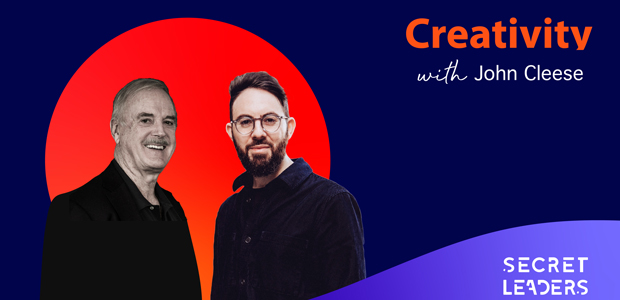
Five practical ways to supercharge your business by fostering more creativity
The Secret Leaders Podcast is now launching its sixth season (starting with John Cleese), Secret Leaders has rapidly grown into one of the UK’s most popular business podcasts (often ranking number 1 according to Apple). Hosted by serial founder Dan Murray-Serter whose entertaining but intimate style allows him to elicit surprising and personal revelations from his guests, and here we get a chance to read about some of the first episode.
The first episode from the new season of the Secret Leaders podcast (which launched today 27th October), John Cleese tells Dan five actionable ways that business leaders can make their organisations more creative, fueling more growth.
1. Don’t have any preconceptions of what you’re trying to create
[When first pitching Monty Python to a TV executive] “We went into a meeting with the guy who ran comedy. He said, "I hear you'd like to do a series?" We said we'd love to Mr. Mills. He said, "what do you propose?" And we said we hadn't discussed it. Which sounds like total insanity, but when you look back at the very fact that we'd not made a statement of what we were going to do, it left us incredibly free to discover what we were going to do - otherwise we would have been limited by what we'd already committed ourselves to.”
2. Establish a culture without fear of failure
“When you're being creative, you don't know where anything is going to lead... You just start free associating and you don't know whether that's going to be a profitable avenue to go down or not. So there's no such thing as a mistake. And in a group, somebody sometimes will say something that someone else misunderstands and then as a result comes up with an idea they wouldn't have had if the other guy hadn't said something, which they’d misunderstood. So there's no such thing as a mistake but the fear of making a mistake is very strong in kids - and they obviously must pick it up from society.”
3. Create an environment where individuals can work with no distractions
“I’m an introvert and people are always surprised by that. They think performers are extroverts. No, we're not at all. We have a stage personality. Some performers are extroverts, but I'm not. And that means that if I spend a whole day amongst people, I'll enjoy it, but then I have got to get back to my house and be very quiet with my cats and my wife and a book, or play chess against myself because I just need to recharge my batteries…. “So this has a tremendous effect on something like open planning and offices. I mean, some people would rather have lots of people coming in and chatting to them all the time. Well, that's good in an open plan office, but introverts don't operate like that. And introverts, who tend to be more creative than extroverts, above all, want not to be interrupted. So why would you put an introvert in an open plan office? That’s sabotaging an introvert’s abilities and there's a lot of research showing that it doesn't work particularly well.”
4. Encourage extreme selfishness
“You've got to put yourself first for a time. Normally, we feel if somebody knocks on the door of our office, we ought to let them in. And you just have to say, no - this is a period of extreme selfishness where I don't want to be interrupted and I just want to be quiet and have fun and think. And I may come up with ideas that make everybody's job expectations rather improved. That's why businessmen need to have ideas, because otherwise the company goes on doing what it's done before and then it gets overtaken.”
5. Make sure your leadership structure is designed to support creativity
“...one of the mistakes that was made [in the UK] was to take over the American model where you have a CEO. The old fashioned English one was you had a Chairman and a Managing Director. The Managing Director was doing the quick thinking, fixing problems, dealing with lots of important responsible stuff, doing a great job - but busy. The Chairman was the one who sat there having a vague idea of what was going on - with the company sort of sinking into the distance - saying, ‘well, how would it be if…’
They are the two halves of the mind. I think if you have one person in one half, and one in another - and they get on well together - that may be a better way of running things than having one person who's trying to do both.”

